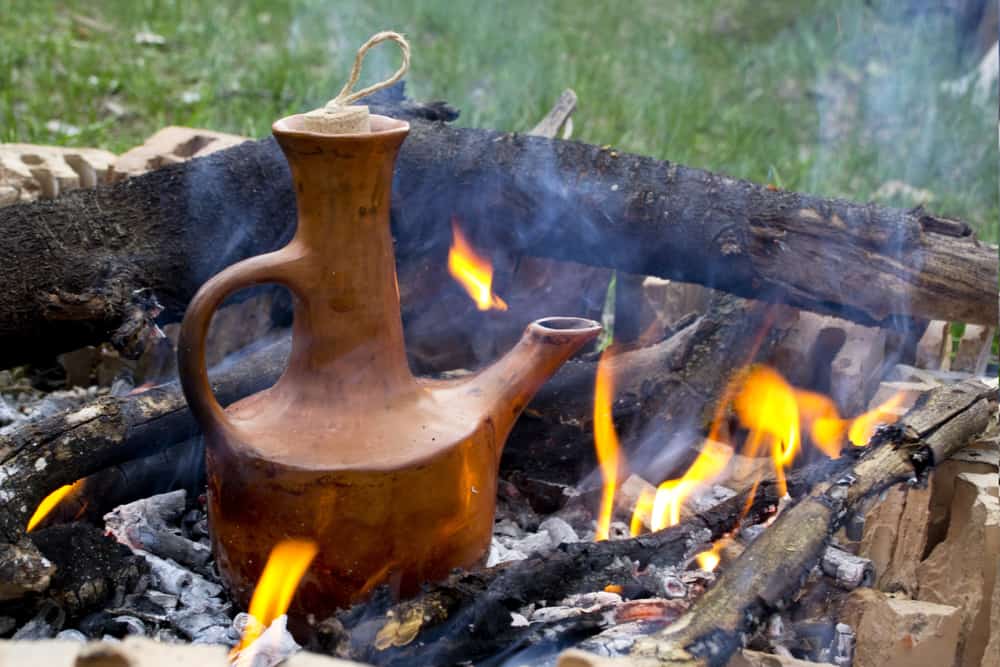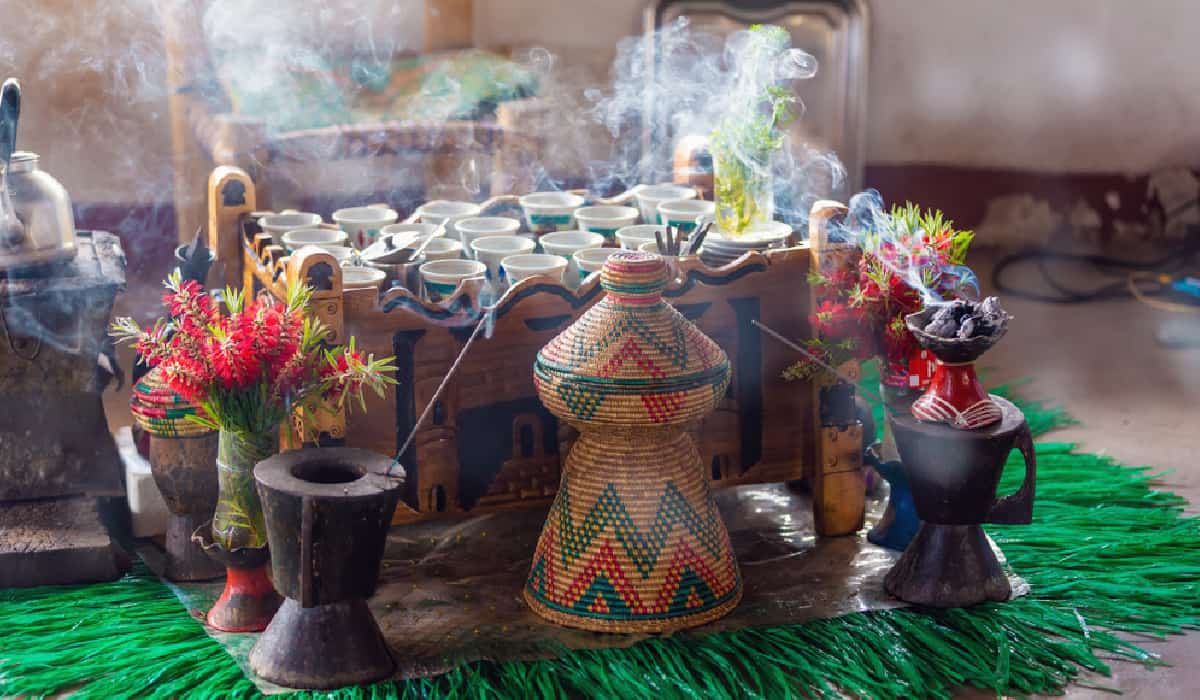As an Amazon Associate I earn from qualifying purchases.
Ethiopia has long been known as the birthplace of coffee.
While the veracity of this claim may be argued, it seems to be true that Coffea arabica really only flourished once it reached Ethiopia and was recognized as consumable by humans (although they first just ate the fruit).
Ethiopia’s unique production methods and grading system have resulted in coffee that provides unbelievable floral and fruity notes. Something that is obviously not lost on locals.
In fact, if you think Americans love coffee, you should visit Ethiopia and experience the Ethiopian Coffee Ceremony.
The American morning ritual of stumbling to the kitchen and flicking on your coffee maker is absolutely dull by comparison.
In Ethiopia, preparing the coffee is an honored task and consuming it with friends is a social experience that dates back hundreds of years. Before we dive a little bit deeper into this coffee ceremony, however, we have to lay some groundwork.
What Exactly is the Coffee Ceremony?
The Ethiopian Coffee ceremony is practiced both by those from Ethiopia and those from Eritrea. Eritrea was once a part of Ethiopia and has since left the nation of Ethiopia and formed its own union, culture, and traditions.
At its most basic, the Coffee Ceremony is the ritual of making and serving drinking coffee.
Usually, this ceremony will take place in honor of guests coming to visit. The ceremony is also performed on a regular basis as a normal part of daily life, inviting family and friends over for regular company. These ceremonies of daily life happen up to three times per day (usually with each meal) and can involve up to three hours of time per ceremony.
The Significance of Coffee in Ethiopia and Eritrea
This ritual of making and serving coffee has a heavy cultural significance for Ethiopians and Eritreans alike, and in some villages, is actually considered the most important social occasion of all.
Coffee was first exported from Ethiopia in the 1600s and has remained an important cultural and financial part of the country’s identity.
The significance for Ethiopians does not end with the social gathering. The Coffee Ceremony has spiritual significance as well. There are spiritual legends surrounding the coffee culture of Ethiopia, which help to explain the spiritual significance of this hot drink.
One legend involves a man noticing his goats eating coffee cherries near a monastery and introducing the hot drink to the monks by accident. The legend goes on to depict the monks drinking the coffee, and vowing that it would be used for spiritual devotion, as it aided them in staying awake.
The other legend involves a spiritual Muslim man named Sheikh Omar discovering the coffee cherries while living reclusively in Mocha, Yemen. Whatever legend is true (and it depends on who you ask) there is no doubt that the level of mystique involved in Ethiopia’s coffee ceremony adds to the experience as much as the beans do.
How is the Coffee Ceremony Performed?
The Coffee Ceremony is typically performed by the women of the household and involves both the brewing and the serving of the coffee.
Preparations
Before the hostess performing the ceremony begins brewing her coffee, she sets the stage for her ceremony by decorating with flowers and grass, which are spread onto the floor. Typically there will be some sort of incense burned as well.
Roasting the Beans
After the stage has been set with fragrances and visual stimulation, the hostess preparing the coffee will take a long-handled pan and roast the beans over an open fire. The raw beans gradually become dark and oily, and an invitation is extended to guests to come closer for inhales of the aroma of the rich coffee beans.
Brewing the Coffee

Once the coffee has been roasted, the hostess will take her mortar and pestle and grind her beans until the desired fineness is reached. She will then add the grounds to her jebena, or Ethiopian coffee pot, which contains boiling water.
Serving the Coffee
After the hostess is satisfied that her coffee has boiled the proper amount of time, she will make a show of pouring her coffee from high in the air, into her serving cups. While this seems strictly ceremonial, this method actually helps to trap most of the coffee grounds in the coffeepot, rather than pouring out into the cups with the coffee.
Of course, this aspect of the ceremony takes skill and a bit of grace. Without it, there would be coffee everywhere, and burnt visitors.
Additions to the Coffee
The coffee is served with sugar, or salt in some regions, and is often accompanied by snack foods like popcorn, or peanuts. The hostess may also choose to serve the coffee with some variations, like adding cinnamon, cardamom, or cloves.
On the Part of the Guests
Also accompanying every ceremony is praise from the guests to their hostess, her fine coffee-making skills, and, of course, the coffee itself. Without this component, the coffee ceremony is incomplete.
Can You Experience an Ethiopian Coffee Ceremony?

If you’re able to visit Ethiopia or Eritrea, the likelihood of experiencing this elaborate coffee-making tradition is strong. Coffee shops and cafés often host these traditional ceremonies and welcome non-residents to enjoy and participate.
In the United States, you may also be able to experience this ceremony if you find an Ethiopian or Eritrean restaurant. They often host the ceremonies on special occasions, and welcome non-Ethiopians to participate in and appreciate this culturally significant event.
Linger and Enjoy
If you are able to attend one of these ceremonies, prepare to linger afterward for conversation and social interaction. Drink the ceremony coffee, praise your hostess, and linger awhile. The purpose of these events is to do exactly that.
Conclusion
If you want to experience an Ethiopian coffee ceremony you’ll probably have to do a bit of traveling or find a coffee shop that provides the experience. In many places, you’ll be able to find an Ethiopian restaurant or coffee shop that will gladly provide the experience for you, whether they advertise it or not.
But first, maybe just order some fine Ethiopian coffee beans and enjoy the mystique of northern Africa in your own home.







